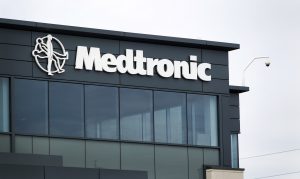 Medtronic Plc. (NYSE:MDT) has announced its intentions to buy HeartWare International Inc. (NASDAQ:HTWR) for about $1.1 billion. Medtronic will pay $58 a share in an all-cash transaction, according to a statement made on Monday. Both boards unanimously approved the deal, which is expected to close during its second quarter, which ends on Oct. 28.
Medtronic Plc. (NYSE:MDT) has announced its intentions to buy HeartWare International Inc. (NASDAQ:HTWR) for about $1.1 billion. Medtronic will pay $58 a share in an all-cash transaction, according to a statement made on Monday. Both boards unanimously approved the deal, which is expected to close during its second quarter, which ends on Oct. 28.
The deal price represents a premium of 93 percent over the company’s Friday closing price of $29.98 and market value of $525.87 million. HeartWare rose 92 percent to $57.52 at 11:04 a.m. in New York, while Medtronic fell 2.4 percent to $81.28. Chief Executive Officer Omar Ishrak said that the deal will minimally dilute Medtronic’s earnings per share for the first two years and will contribute to earnings in the third year. The company’s revenue outlook or earnings per share for fiscal year 2017 remains unchanged.
Medtronic is currently the world’s biggest maker of heart-rhythm devices. HeartWare is the second biggest player in the U.S. heart pumps market with a 40 percent share. Thoratec Corp., HeartWare’s only competitor, leads the market with a 60 percent share. St. Jude Medical Inc. bought Thoratec last year for $3.4 billion. The global heart pump market is currently estimated to be about $800 million and is expected to increase by 4 percent to 9 percent this year and next.
The deal will help Medtronic take the lead in treating heart failure. Heart failure is a condition where the heart doesn’t pump enough blood to meet the body’s needs. Heart failure is a leading cause of hospitalization and death in the United States. The National Center for Biotechnology Information estimated in 2010 that heart failure expenditures were about $39 billion per year in the U.S. Data from the CDC shows that circulatory diseases are responsible for one in every four deaths in the U.S.
HeartWave develops less-invasive technologies for patients with end-stage heart failure. The company makes ventricular-assist devices, which are surgically implanted battery-operated mechanical pumps. The company is also developing a next-generation heart pump that is 40 percent smaller than its current offering.
